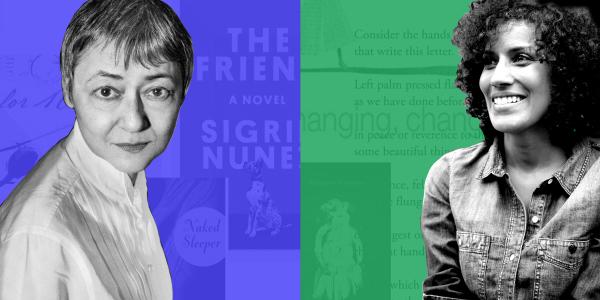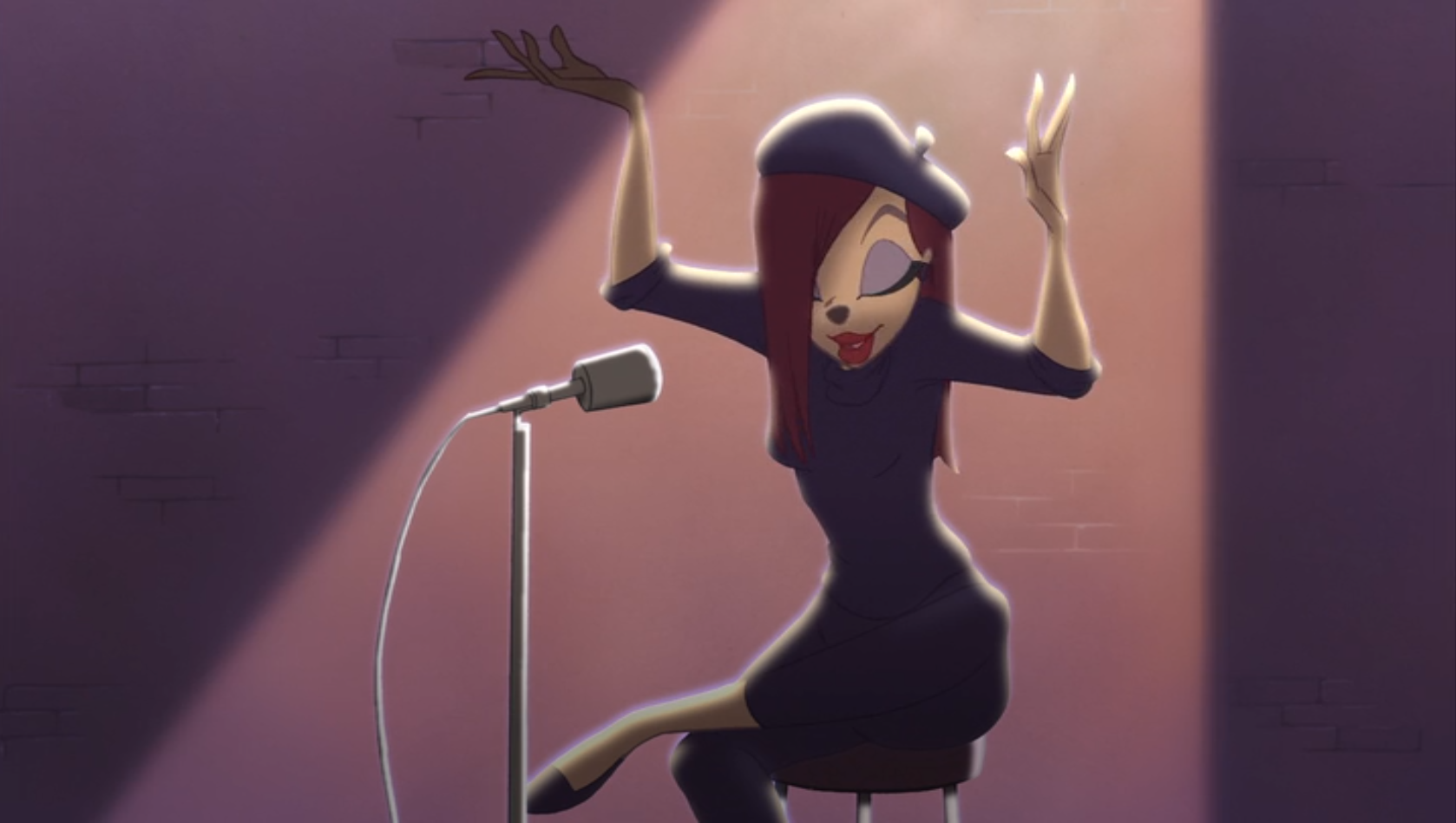The esteemed poet Natasha Tretheway will be reading at the Hopwood Awards Ceremony tomorrow Jan 30 from 6-8:30 PM in the Rackham Auditorium. Her work has won many accolades from the Pulitzer Prize to longlistings for the National Book Award. Tretheway seamlessly merges traditional and non-conventional styles in her poetry and powerfully comments on history as a contemporary poet. The even will also announce and celebrate its student writers who won the 2019 Hopwood Awards. I look forward to a delightful evening of literature with the creative writing community on campus. This event is free.
Tag: poetry

PREVIEW: Xylem’s Crazy Wisdom Open Mic
Some people look to celebrities for fashion or lifestyle inspiration, fawning over their manicured looks and multi-million dollar homes. Personally, I aspire to be half as cool as Beret Girl from An Extremely Goofy Movie.
You know her, that poet from the Bean Scene coffee shop. Definitely the ultimate cool girl, even though she’s a fictional character.
Anyhow, if our dreams to become anything like her are to come to fruition, we need to first bust into the open mic scene.
We’re in luck: Crazy Wisdom Bookstore and Tearoom is hosting an open mic night Wednesday, November 28 from 7-9 PM. Bring your poems, your spoken word performance, those bars of slam poetry you’ve been waiting to give to the world. Or, you can just bring your ears and absorb the cool atmosphere, find a good book, and drink some tea. Whatever you choose, this is the place to be this Wednesday night.
PREVIEW: Zell Visiting Writers Series: Sigrid Nunez & Aracelis Girmay

For the second installment of the Helen Zell Visiting Writers Series, we will be joined by Sigrid Nunez and Aracelis Girmay. Nunez is a novelist who has published seven books, the most recent of which is The Friend. She is interested in writing about language, memory, and writing itself in her work. Girmay is a poet whose work, according to the Poetry Foundation, “trace[s] the connections of transformation and loss across cities and bodies.” These poets have powerful messages about the subtleties of human nature. Join Michigan’s literary scene on Thursday, September 27 5:30-6:30 p.m at the UMMA’s Helmut Stern Auditorium.

REVIEW: Student Poetry Reading
When I rushed from my 3-6 class in East Quad to the 6-8 poetry event in the Institute for Humanities, I was a little surprised to see so many people standing and sitting along the wall — all of the seats were taken. I hadn’t seen very much advertising for the event (and honestly didn’t know if the poetry community at UM stretched to this size). I sat alongside the wall with some professors and students, all of us celebrating the start of National Poetry Month together.
Laura Kasischke, a writer and professor of poetry in the Residential College, introduced the event with a Wyn Cooper poem, “Fun,” the foundation of which Sheryl Crow used for one of her popular songs. With that tidbit, Kasischke described Cooper as the richest poet without many people even knowing. Her opening was (from my memory) the only interpretive reading — the rest of the evening was all originals.
For the next hour and a half, several UM students read their own work. It was admirable to see that they came from such a range: while several were there for an RC poetry class and/or studying creative writing, some were on their way home from the School of Information or business students working on a project with poetry relating to anorexia. One of the last student readers even read from a published book of their own poetry. Regardless of student background, there was no poem by which I wasn’t impressed.
In fact…I was so enthralled in the poetry that I don’t remember many names or titles. Oops.
The first student read an ode that came from a poetry class assignment, followed by a few more students reading from the same course. I enjoyed this for the chance to see the hybridity of different poems coming from the same teaching and prompts. While this wasn’t necessarily required, most if not all readers prefaced their work with a little information about where and why they wrote it. Sometimes I’m more interested in the work standalone, but perhaps this gives another crucial layer to understanding the work, thus changing that opinion of mine.
I especially loved that most of the students read multiple poems — several read 2-3 pieces, though one student in particular read what seemed like 10. This was great as a chance to really get to know their style. I also participated, reading 3 pieces (one of which I hadn’t yet shared with the world beyond my own poetry professor).
The UM poetry community seems more niche and separate than it really is. When all of the students exhausted the pages they brought along, the event turned into a chance to chat among each other. I loved this unexpected element and upkeep in energy. For most of the poetry events I’ve attended and/or participated in, the poetry took up the entire time without very much time to debrief or get to know the other attendees/readers. This was where I realized that I had attended previous readings with these same incredible, young poets — further highlighting that community aspect.
It was a supportive space from start to finish, with applause turning into personalized encounters along the lines of “I really loved your poem about ____” shared among strangers. Poetry brought us all together that windy Wednesday evening and I hope to meet them again.
All of this is to say, there’s always room for more poets everywhere! I hope y’all visit some other poetry events. Even better, maybe try your hand at writing and/or sharing your poetry this month. I’d love to read and celebrate it.

PREVIEW: Student Poetry Reading
Happy National Poetry Month! If you’re looking for a way to kick off this excellent and literary-charged month, new to the poetry scene, or just happen to be around Thayer Street this Wednesday evening (tomorrow), come hang out and listen to some of your fellow students read poetry! This informal open-mic style event is free and open to anybody who would like to listen to and/or read their work. Slightly more information can be found here.
Date: Wednesday, April 4th
Time: 6-8pm
Location: Institute for the Humanities Lobby
(202 S. Thayer, across from MLB/North Quad)

REVIEW: Nell David & Franny Choi
On Friday night, the Helmut Stern Auditorium of UMMA was a small and cozy literary haven away from the museum’s After Hours event beginning upstairs. Though I attended alone, several Zell MFA friend groups and writer-enthusiasts (and probably writers themselves) around me gathered and giggled while we all waited for fiction writer Nell David* and poet Franny Choi to take the stage. The atmosphere was excited and comfortable.
In the tenth installment of its kind, two current MFA students emceed this year’s Webster Reading series. David was the first to read, and one of the emcees read her introduction: at an AWP conference in Washington, DC, the two strolled from table to table finding magazines in which David’s work was published. In each, her last name was different – a detail that interested me from the get-go of the evening. “At age 25, she was writing better fiction than people five years out of their MFA programs and didn’t give a damn about the name she put on it,” the emcee joked.
David, or [redacted] as they had also earlier joked, took the stage with the first few pages of a short story called “Joyce is Better Now.” The story was about a single mother whose son had just moved out for his first year of college, and how she fell in love with a doctor she had been seeing. While I’ve been paying more attention to poetry than fiction these days, I was still struck by her characters and how she moved through the piece. Characters, notably Joyce herself, were relatable yet given realistic and unique voices. I was reminded of life itself as they focused on small desires in a big world: two themes I noticed were those desires of finding honesty in already friendly relationships and being candid yet kind. Her reading style was confident and reserved, and I appreciated that she laughed at a funny line of her own. The excerpt she read gave us just enough information that we didn’t get the entire story, but wanted to know what happened next and how Joyce’s endeavors turned out.
Next was Choi, introduced by a different student (I think – or peer). He introduced her personality as a poet and commended her talents: “Saying that you’re a famous poet is like saying you’re a famous mushroom. Franny is the morel of poets.”
I’ve seen videos of Choi doing slam poetry a few years before, but this was a new experience. Slam poetry usually consists of some storytelling with sounds written to be heard on stage alongside movement, and I could sense those sounds echoing in her work within wordplay and patterns that I wouldn’t have expected. Sound aside, the images evoked were abundant and worked into one another while working together and alongside one another – stunning. She spoke with her hands and read so confidently, too, which also made me think of spoken word and slam poetry trends. Again, I was struck by the writing, especially as a poet myself.
Her first work that she read was from a collection about conducting a Turing Test on herself to see whether she’s actually a robot, though she read different poems thereafter (including one I’ve seen recently, “On the Night of the Election”). Before reading “You’re So Paranoid,” she noted that she’d never read it aloud before, and took a short pause before starting. That small moment was so beautiful, and I wondered whether she was considering the best way to read it, or whether she was capturing the moment for herself and the poem. Another intriguing piece she read was partially in response to the conversation about allowing neo-nazis speak on campus and a video wherein Richard Spencer used an image of her face, “The Cyborg Watches a Video of a Neo-Nazi Saying Her Name.” I liked how she bookended her reading, ending with a piece called (and reading the title in a voice that reminded me of an AI voice) “So, How Do You Like Working with Humans?”
Something that I appreciated about her reading lineup was that she interspersed poems about the aforementioned collection with others unrelated to it, but still managed to flow from one to the next cohesively. It was well-rounded and full of incredible work.
There was lots of writer’s confidence in the auditorium that evening, which extended to me, and for which I was grateful. I encourage y’all to read and support these talented writers as well as those who share the community here in Ann Arbor and beyond – or at least attend an MFA reading at some point.
*I wanted to include links to Nell David’s work in this review, but had some trouble finding her online and would appreciate any located links in the comments!


